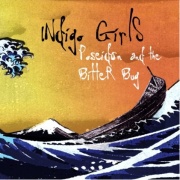Poseidon and the Bitter Bug
- Rock
- 2009
- Buy the CD
Reviewed by Jeff Giles
()
Of course, as any Indigo Girls fan would hasten to tell you, their albums have always been pretty solidly grounded, and have never made many commercial concessions – so to the casual listener, Poseidon and the Bitter Bug won’t sound all that different from anything else the Indigos have ever done. It hits all the usual spots: Deceptively simple, acoustic-based arrangements; songs about love and social issues; acres and acres of beautiful, effortlessly braided harmonies. For over 20 years now, Amy Ray and Emily Saliers have been recording dependably solid albums of dependably solid songs, which has probably worked against them – they’re the kind of band that most people recognize as worth paying attention to, and their work almost always ages well, but they’ve never been cool or exciting. Basically, the Indigo Girls are the Honda Civic of folk-pop – not a bad thing to be, really, unless you want to get on the cover of Rolling Stone or go multiplatinum.
True to form, Poseidon may not sell in the millions, but it does get the old sedan started up one more time, and damn if it isn’t running as well as it ever has. Again, to the casual listener, none of these songs will sound all that different from anything on Swamp Ophelia, Become You, or anything else the Indigos have released since 1989, but fans will notice Ray and Saliers branching out in some mildly surprising new directions. The differences are primarily vocal – Ray actually handles the high harmonies on a couple of tracks, and they opt for singing in unison on one song, "Love of Our Lives" – but they sound re-energized artistically, too, particularly Saliers, who halts her slide down the ever-sappier slope she’s been on over the last several years and turns in a set of songs that, although certainly very pretty ("Fleet of Hope") and soul-baring ("I’ll Change") also show a little tooth and nail ("What Are You Like"). Ray, for her part, extends the winning streak she’s been on for the last decade with tracks like "Sugar Tongue," which is the most hummable indictment of colonialism you’re likely to hear this year. (At least.)
Fans may blanch at reading Mitchell Froom’s name on the album’s production credits, but they can take comfort in the knowledge that his work on Poseidon is far less shrill than the stamp he placed on Differences; aside from the occasional vintage keyboard, Poseidon really doesn’t sound like a Froom production at all – for the most part, it sounds more like a stereotypical Indigo Girls album than anything they’ve released in quite a while.
And that goes double for Poseidon’s second disc, which presents the album’s tracks recorded in an acoustic setting. None of the full band arrangements are what you’d call dense, so stripping the songs back this way isn’t exactly revelatory, but it’s still a nice bit of bonus content; hearing Ray and Saliers perform with nothing more than their voices and guitars reminds you of all the reasons they’ve been so successful all these years. It also reinforces the source of their appeal – even though nothing here boasts the immediate gratification of their strongest work, the Girls’ voices sound better together than ever, and as a result, Poseidon bears up under repeated listening. Chalk up another win for "dependably solid."
You can follow us on Twitter and Facebook for content updates. Also, sign up for our email list for weekly updates and check us out on Google+ as well.













